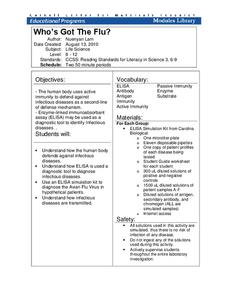Rice University
Biology for AP® Courses
An eight-unit electronic textbook provides a guide to AP® Biology. Each of the 28 chapters include an introduction, multiple lessons, a summary, review questions, and test prep questions. Teachers see how each lesson connects to a big...
Curated OER
Regents High School Examination: Living Environment 2003
The living environment, from the interior of a cell to the complex relationships among populations, are queried in this final examination. Learners look at air pollution maps, diagrams of cells, population graphs, and drawing of cells....
Curated OER
Regents High School Examination: Living Environment 2005
The 2005 version of the Regents High School Examination in the area of ecology is as comprehensive as previous years' exams. It consists of 40 multiple choice questions on everything from the structure of DNA to the interactions within...
Curated OER
Regents High School Exam: Living Environment 2008
Tne New York Regents High School Examinations are comprehensive and include various styles of questions, includingmultiple choice and the analysis of graphs. This particular version, the 2008 Living Environment exam surveys a variety of...
American Museum of Natural History
What Do You Know About the Human Microbiome?
Scholars answer 10 multiple choice questions to test their knowledge about the human body and microbes. Correct answers come with a rewarding tone and brief description.
Nemours KidsHealth
HIV and AIDS: Grades 9-12
Two activities help high schoolers learn about HIV and AIDS. First, groups read and discuss articles that provide information about sexually transmitted diseases and conduct further research to gather current information. They then...
Exploratorium
Antibody Attack - Discover How Antibodies Launch Attacks on Invaders
Jump into the action and help antibodies defend against an antigen attack! Investigators match antibodies with antigens to model the body's identification and recall of specific pathogens. Young biologists also recognize that each...
Exploratorium
Skin Shield - Explore the Body’s First Line of Defense Against Pathogens
Make pathogens and the body's defense systems come alive for young biologists in a hands-on activity. Investigators model the skin's protection against infection by observing and comparing changes in a punctured tomato and an intact...
Nemours KidsHealth
Cold and Flu: Grades 6-8
Wouldn't it be lovely if people were immune from colds and flu? Alas, such is not the case; however, there are things we can do to avoid getting or spreading these pesky health hazards. Middle schoolers read articles that provide them...
Nemours KidsHealth
Colds and Flu: Grades 9-12
Flu fighters unite! To get the word out about the importance of getting vaccinated against the flu, groups create posters that persuade teens to get immunized. Also, scholars read articles about how to cope with colds, then create...
Nemours KidsHealth
Food Allergies: Grades 6-8
Over two lessons, scholars use articles and discussions to define what a food allergy is and identify the most common food allergens. Small groups prepare a skit showcasing how the body exhibits an allergic reaction. Learners examine...
Children’s Hospital of Philadelphia
The Innate Immune System
My body is my castle. Pupils learn about the innate immune system in the second lesson plan of a three-part unit on the immune system by comparing the innate immune system to a castle and moat. Groups conduct a simulation where they try...
Children’s Hospital of Philadelphia
The Adaptive Immune System
Attack the pathogen from within. Learners delve deeper into the immune system and find out about the adaptive immune system such as T and B cells. Groups create graphical models of the adaptive immune system along with a multimedia...
Children’s Hospital of Philadelphia
Organs and Tissues of the Immune System
It's virus-fighting time! Pupils learn how viruses attack and reproduce and how the immune system works to protect the body. They identify unfamiliar terms and tissues and organs of the immune system. Working in small groups, scholars...
Children’s Hospital of Philadelphia
Case Study: The 1918 Influenza Pandemic – Factors Beyond the Biological that Influence the Spread of Disease
A very timely lesson looks at the social and political factors that affect the spread of disease. Using the 1918 Influenza Pandemic as a case study, pupils research factors that influenced the spread of the disease, including the role of...
Nemours KidsHealth
Germs: Grades 9-12
Beware the bugs! Two activities engage high schoolers in the study of germs, what they are, what they do to the body, and what can be done to prevent them from spreading. After reading a series of related articles, groups create a...
Healthy Native Youth
Chapter 4: Learning About Disease
Communicable diseases are the focus of a lesson that primarily uses discussion, a hands-on activity, and a worksheet to drive their point home. Lotion and glitter create a strong visual for communicable diseases. A practice page provides...
College Board
2014 AP® Biology Free-Response Questions
The most popular AP science exam, Biology, also maintains the highest passing rate. The College Board releases old test questions covering trichomes and much more, along with statistics and scoring guidelines to help scholars study for...
College Board
2015 AP® Biology Free-Response Questions
Many future doctors earn college science credit by passing the AP biology test while still in high school. Help young scientists prepare for the exam by studying past test questions. Each of the eight questions covers multiple topics...
Howard Hughes Medical Institute
Cells of the Immune System
You won't be able to resist the content of a great presentation! Young immunologists discover the variety of cells involved in keeping our bodies free from pathogens with a resource that contains both slides and video clips. The included...
Next Generation Science Storylines
Why Don't Antibiotics Work Like They Used To?
Bacteria get more resistant to antibiotics every year. Learn the reason for this pattern and how scientists are addressing the problem in a six-week unit. Learners analyze different types of bacteria and their adaptations.
Cornell University
Who’s Got The Flu?
Become an immunologist for the day. Scholars elicit the use of the enzyme-linked immunoabsorbent assay (ELISA) to diagnose an infectious disease. Through the process, they learn about the immune system response to infectious diseases.
Concord Consortium
3D Exploration of Bound Antibody and Antigen
Our body manufactures antibodies that are the exact shape for the antigens it encounters. The simulation shows a 3-D model of an antibody and antigen pairing. It allows young scientists to explore the complementary shapes.
Pearson
Immune System – Guarding Against Disease
Health fact: Washing your hands is one of the most important ways to protect your body from germs. Share this advice and many other tips for guarding against diseases such as the cold and flu virus with a colorful 73-slide PowerPoint...

























